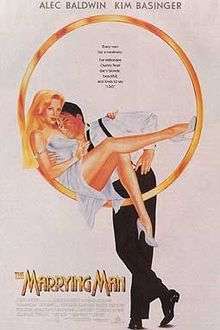The Marrying Man
| The Marrying Man | |
|---|---|
 Theatrical release poster | |
| Directed by | Jerry Rees |
| Produced by | David Permut |
| Written by | Neil Simon |
| Starring | |
| Music by | David Newman |
| Cinematography | Donald Thorin |
| Edited by |
Michael Tronick Michael Jablow Michael R. Miller |
Production company | |
| Distributed by | Buena Vista Pictures |
Release date | April 5, 1991 |
Running time | 116 minutes |
| Country | United States |
| Language | English |
| Budget | $26 million |
| Box office | $12.5 million |
The Marrying Man (known as Too Hot to Handle in the United Kingdom and Australia) is a 1991 American romantic comedy film, directed by Jerry Rees,[1] written by Neil Simon,[1] and starring Alec Baldwin and Kim Basinger.[1] The film opened to poor reviews and did not break out at the box office, with Basinger's performance earning her a Golden Raspberry Award nomination for Worst Actress, where she lost to Sean Young for A Kiss Before Dying.
Plot
Charley Pearl is the heir to a toothpaste empire's fortune. He is a playboy who does not work, spending his time indulging in hobbies like speedboats and fast cars. Charley is engaged to the daughter of Lew Horner, a foul-mouthed, hot-tempered Hollywood studio mogul. Horner is concerned that Charley has no ambition and no apparent guilt about it.
His four best friends accompany Charley on a drive to Las Vegas for a bachelor's fling. Charley is willing to foot the bill for Phil, Sammy, Tony, and George but is eager to get back home to his fiancee. They make a quick stop for a drink at a nightclub where Vicki Anderson, a glamorous singer, disrupts Charley's thoughts of wedded bliss. He tries to pick up Vicki after her performance but is warned that she belongs to somebody else. Vicki responds to Charley's charm, however, and offers to leave a window open at her home. Charley shows up and they end up in bed, only to be caught by her other lover—Bugsy Siegel, the notorious gangster.
Bugsy amuses himself with the notion that he will take the scared-stiff Vicki and Charley to a justice of the peace in the middle of the night and make them marry one another. Charley drives her back to California and offers to pay her expenses, but Vicki walks out. In the meantime, their wedding photo pops up on the front page of the morning newspaper—with Charley's engagement announcement to Lew Horner's daughter appearing on a later page. Charley apologizes and still wants to marry Adele. He agrees to get an annulment from Vicki and to pay a considerable sum to charity if he should dare disappoint Horner's daughter again.
Charley runs into Vicki again and can not help himself. Charley remarries Vicki, again leaving his fiancee in the lurch. Lew Horner stops just short of killing Charley, instead sending a couple of thugs to beat him and toss him into a swimming pool. Vicki is happy, too, momentarily, coming home with an offer that could advance her career, only to learn that Charley's father has died and he is needed in Boston, where he is expected to run the family's business.
Vicki puts her career on hold and spends two years in Boston, enduring high society and boring tea parties. She can not wait to get back to California and her career, but when Charley reneges on his promise, Vicki gets a divorce. Charley and his friends track Vicki to a nightclub where she has taken up with another shady figure. They become involved in a violent brawl. Charley then makes off with Vicki and marries her a third time. As a gesture of gratitude, Charley sinks millions of dollars into a movie studio where he intends to produce pictures featuring his wife. But while the careers of his buddies take off, Charley and Vicki begin to have children. Nothing at the new studio gets under way, and Charley goes broke, blaming Vicki, who walks out on him yet again.
Divorced and depressed, Charley is found by his friends quite a bit later at a nightclub, where he tells them he has recently gone into a promising new line of work: computers. He stares dreamily at the stage where Vicki is performing her act. Charley shows his friends a diamond engagement ring that he has brought with him. Vicki slides it onto her finger.
Cast
- Alec Baldwin as Charley Pearl
- Kim Basinger as Vicki Anderson
- Robert Loggia as Lew Horner
- Elisabeth Shue as Adele Horner
- Armand Assante as Bugsy Siegel
- Paul Reiser as Phil
- Fisher Stevens as Sammy
- Steve Hytner as George
- Kristen Cloke as Louise
- Peter Dobson as Tony
- Kathryn Layng as Emma
- Jeremy Roberts as Gus
- Big John Studd as Dante
Reception
The Marrying Man was panned by critics, as the film holds a 10% rating on Rotten Tomatoes, based on 21 reviews.[2]